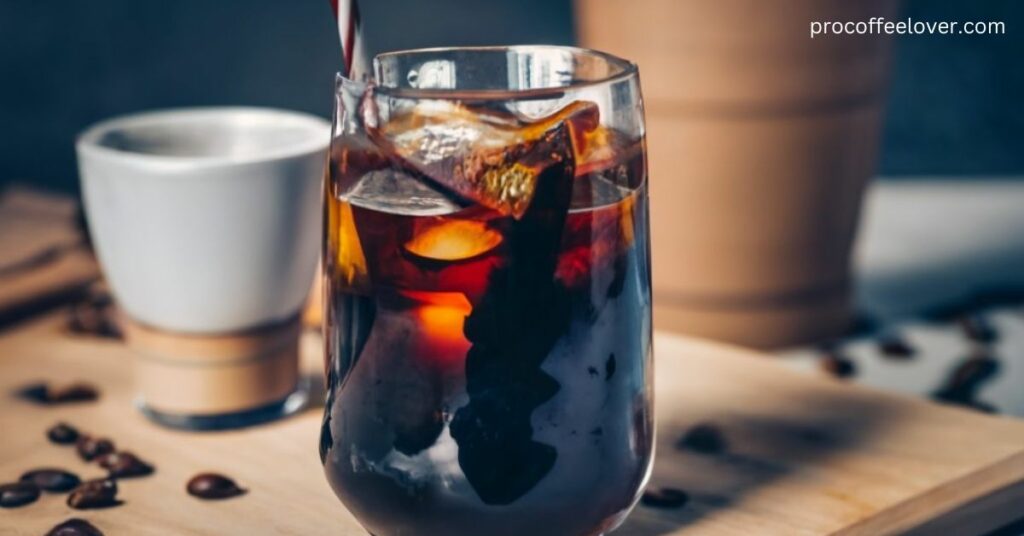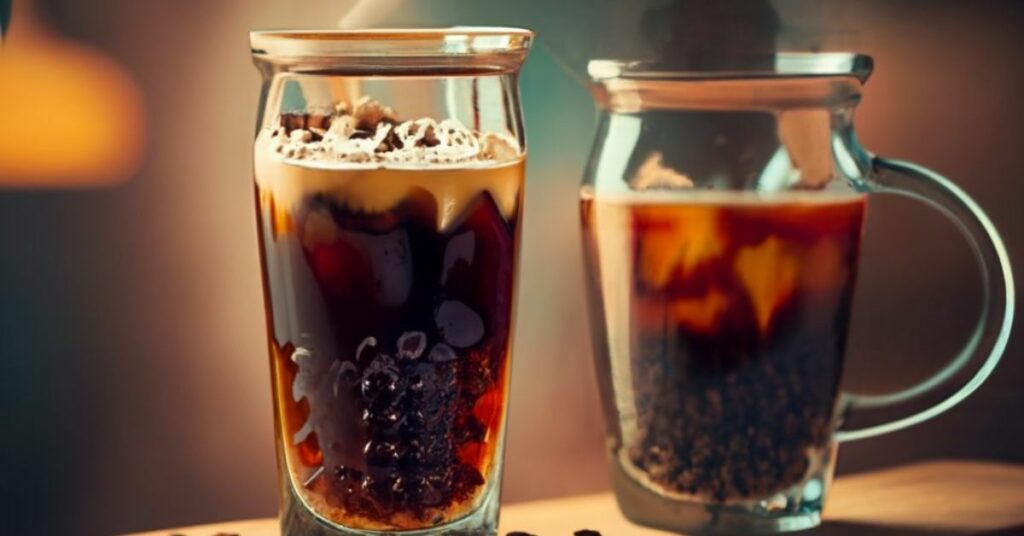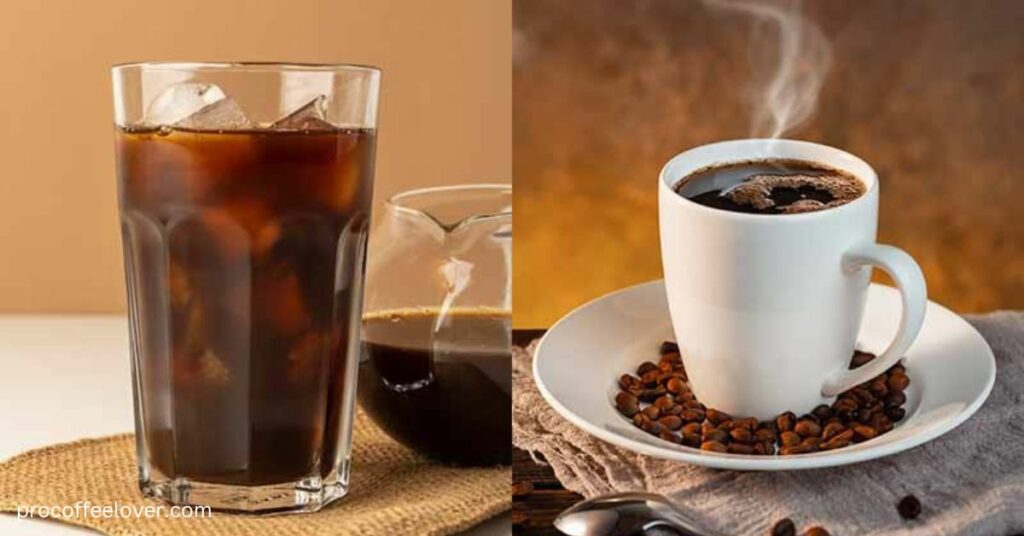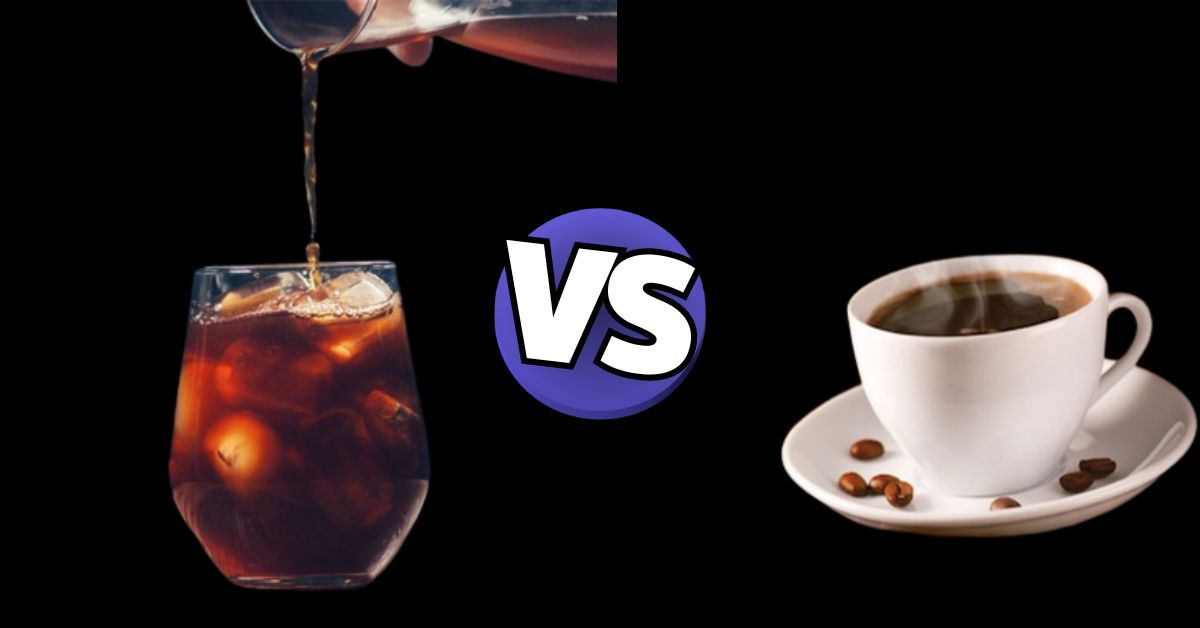Today we will discuss Cold Brew Vs. Hot Brew Coffee.There are various delicious ways to enjoy coffee. There are endless options, whether you prefer it hot or cold, with or without milk or flavored. For coffee enthusiasts, finding the perfect brewing method can be a delightful pursuit.
With many options available, it can be challenging to determine which will best satisfy your taste buds. Among the contenders in the coffee world are cold brew and hot brew. This article will explore the contrasts and flavors associated with these two brewing styles.
By providing detailed insights, we aim to empower you to make an informed decision and uncover which harmonizes perfectly with your coffee cravings. But what exactly are the differences between cold brew and hot brew?
What Is Cold Brew?

Cold brew is a refreshing and distinct variation of chilled coffee. To make a cold brew, simply steep ground coffee in cool or cold water for an entire day. Once prepared, you can store homemade cold brew in the refrigerator for up to two weeks.
It’s important to note that cold brew differs from iced coffee, as it involves the process of steeping rather than pouring hot coffee over ice.
What Is Hot Brew?
Hot brewed coffee results from pouring hot water over ground coffee beans. There are various ways to do this, such as using a French press, a drip machine, or a pour-over coffee maker. Hot coffee is a fast and straightforward way to prepare your favorite coffee drinks.
Cold Brew vs. Hot Brew: 3 Key Differences
When it comes to comparing cold brew and hot brew coffee, there are several notable distinctions:
Flavor:
Without hot water to extract all the acidity from coffee beans, cold brew coffee offers a slightly smoother and less bitter taste than traditional hot brew coffee.
Brewing Time:
Hot brews are ready in minutes, while cold brew demands patience, taking up to twenty-four hours to develop.
Acidity:
Cold brew is less acidic compared to hot mixture. If you’re someone who experiences heartburn with regular coffee, cold-brewed dark-roast coffee is a gentler option.
Let’s discuss some more details regarding the topic.
Transforming Flavors: The Cold Brew Magic
This goes beyond taming bitterness and acidity; it’s a game-changer in the taste departmentLet’s skip the complex chemistry stuff. The makeup of brewed coffee changes significantly. Picture this: You try a cup of hot coffee and a glass of cold brew made from the same beans.
They share a coffee heritage, but the flavors will catch you by surprise.A superb cup of hot brew delights with a full-bodied flavor, a satisfying aroma, a subtle hint of sweetness, a zesty acidity, and a touch of mild bitterness to balance it all out.
In contrast, exceptional cold brew presents a velvety flavor, abundant sweetness, a gentle touch of acidity, and practically no bitterness.Hot-brewed coffee releases its aromatic charms immediately. Cold brew, however, has a well-kept secret behind its muted initial aroma.
Here’s the scoop: When coffee oils are hot, they’re volatile – quick to evaporate. But these oils stay calm in the cold brew process, keeping them from escaping. When you savor a sip of cold brew, these trapped aromatic oils burst onto your taste buds, producing vibrant flavor.
Cold Brew: A Smooth And Mellow Coffee with Reduced Acidity And Bitterness

Using cold water to brew coffee brings out unique qualities you’ll taste right from the first sip. One striking difference is the reduced acidity and bitterness in cold brew coffee compared to its hot-brewed counterpart.
Let’s dive into the process of extraction. It’s how water dissolves and collects various elements from coffee grounds, such as sugars, acids, soluble particles, and oils.
Different temperatures extract these elements at varying rates. For hot coffee, the sweet spot is usually 195 to 205 degrees Fahrenheit. Go hotter, like 210 degrees, and you risk extra bitterness because super-hot water can transform acids into more bitter compounds.
On the other hand, lower temperatures, around 185 degrees, may result in a brew that’s overly sour because the water isn’t hot enough to dissolve the right balance of non-acidic components.
This temperature range strikes a balance to ensure no single acid or bitter element dominates the flavor.Now, cold brew plays by different rules. Cold water slows down the extraction process and alters what gets extracted and what remains in the coffee grounds.
Research has shown that cold brew coffee can be as much as 66% less acidic and bitter than hot coffee.The acids that typically turn bitter in hot coffee take a back seat in cold brew.
The acids that bring sharpness to hot coffee don’t have the chance to become overly tangy and acidic, which happens rapidly with hot water.The result is a captivating, smooth, and refreshing coffee experience.
Caffeine Comparison of Caffeine Levels: Cold Brew vs. Hot Coffee

The argument about caffeine in cold brew and hot coffee can be confusing. Many people online have different ideas about it, but let’s focus on the actual numbers and facts.Caffeine Informer went on a mission to find out how much caffeine is in different ready-to-drink cold brews:
- Chameleon Cold Brew RTD Coffee (10 fluid ounces) 270 mg caffeine.
- Starbucks Cold Brew Coffee (16 fluid ounces) 200 mg caffeine.
- Stumptown Cold Brew Coffee (10.5 fluid ounces) 279 mg caffeine.
- Stumptown Cold Brew + Milk (16 fluid ounces) 319 mg caffeine.
- Califia Farms Cold Brew (16 fluid ounces) 160 mg caffeine.
- Regular Hot Coffee (16 fluid ounces) 326 mg caffeine.
From this data, it’s evident that cold brew caffeine levels exhibit significant variability. Take, for example, the 16oz Califia Farms cold brew, boasting a mere 160mg of caffeine, starkly contrasting to the 16oz Stumptown with a hefty 319 mg, twice the amount.
We have a soft spot for both cold brew and hot coffee, and we even enjoy hot coffee swiftly chilled with ice. Our preferences are straightforward when employing top-quality, freshly roasted beans.
Difference in Brewing Time: Cold Brew vs. Hot Coffee
One big difference between cold brew and hot coffee is how long they take.Cold brew lets coffee sit at room temperature or with cold water for a long time, usually 12 to 24 hours. This slower process makes the coffee smooth and not too bitter, so you don’t always need to add milk or sugar.
My favorite is when I let cold brew sit for 15 hours.On the other hand, hot coffee is made by pouring hot water over coffee grounds in a French press or similar method.
The coffee grounds soak for a much shorter time, typically 3 to 5 minutes, and then they’re removed. Some other techniques, like Chemex or Hario V60, only take about 4 minutes, so they’re even faster.
One reason hot coffee is famous is because it’s quicker to make.The main differences between cold brew and hot coffee come from how fine the coffee is ground, what coffee beans are used, and how long they brew. These differences give each type of coffee its unique taste
Is Cold Brew Stronger Than Hot Coffee?
Cold brew can have more caffeine than regular hot coffee, but it depends on how much coffee is used compared to water. Different hot coffees, like espresso and drip coffee, have different amounts of coffee in water, and the caffeine in cold brew can differ from batch to batch. Usually, cold brew recipes use more coffee than water, but some have less caffeine.
Cold Brew And Your Well-being
Moderate coffee consumption can have some health benefits. Research indicates that it may decrease the risk of heart disease, improve alertness, and potentially benefit individuals with diabetes. There are also studies suggesting that coffee could offer protection against conditions like Parkinson’s disease and Alzheimer’s disease.
However, it is essential to note that these benefits are seen when coffee is consumed in moderation and not excessively.Let’s discuss the benefits of cold brew coffee for individuals who experience heartburn and digestive issues.
Unlike hot coffee, which can sometimes exacerbate heartburn symptoms, cold brew offers a potential solution.Also see more about Bеst Dad Coffее Mug.
Why Choose Cold Brew Coffee?
What makes cold brew coffee unique? It’s worth waiting over 12 hours to make it.It’s worth it. Cold brewing doesn’t just give you more caffeine; it also brings out a more comprehensive range of flavors and chemical elements from coffee beans than hot brewing.
The slow process keeps the brew from getting too sour or bitter, as these qualities don’t develop like when you use hot water.
Cold brewing reveals various tastes and scents that you might not find in hot coffee. Cold brew is the way to go if you prefer a smooth, well-rounded, and mellow coffee over a sharp and bitter hot brew.Also,see more about Dark Roast Coffее Bеans.
Conclusion
Finally we learned Cold Brew Vs. Hot Brew Coffee.To sum it up, choosing cold brew over hot coffee has advantages. Cold brew’s slower brewing process results in a smoother and mellower coffee with a wide range of flavors.
Cold brew coffee provides a well-rounded taste that is less acidic and bitter. For those who enjoy a unique and satisfying coffee experience, cold brew offers distinct qualities that set it apart from hot coffee.
